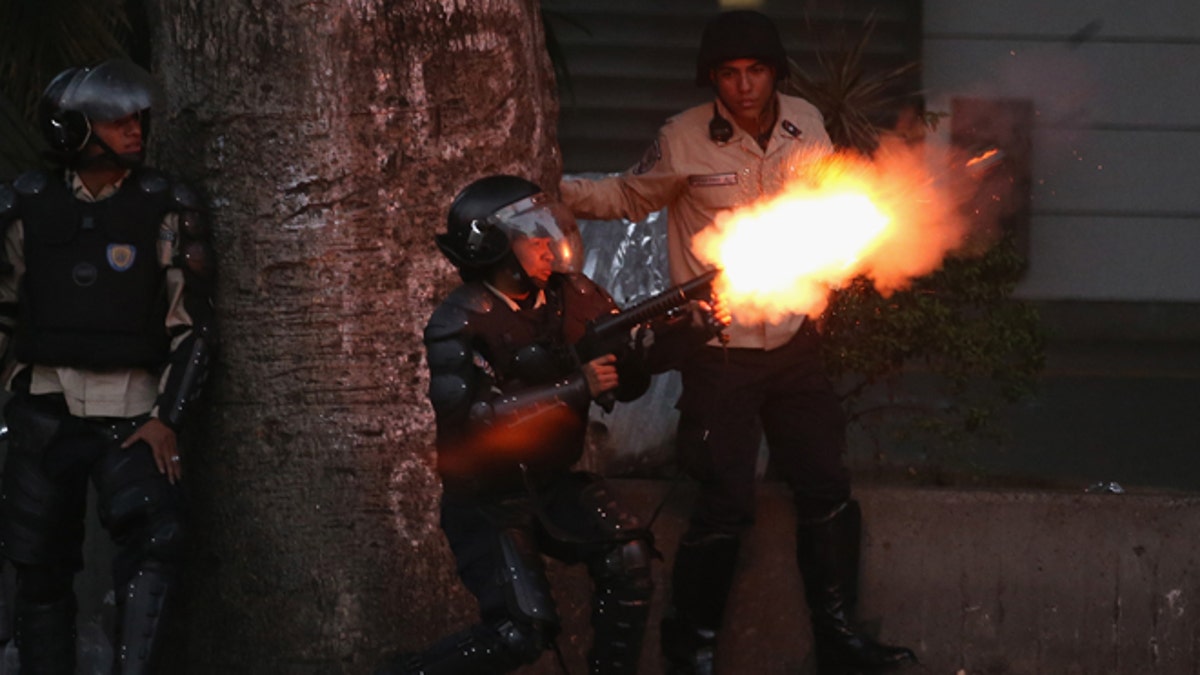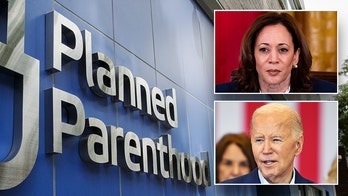
CARACAS, VENEZUELA - MARCH 06: Venezuelan national police fire tear gas at anti-government protesters on March 6, 2014 in Caracas, Venezuela. Three weeks of protests against the federal government have shaken the country as business in much of the nation has come to a standstill. (Photo by John Moore/Getty Images) (2014 Getty Images)
The sanctions imposed by the United States on several high-ranking members of the Venezuelan government this week appear to underscore the delicate dance that Washington is playing with the oil-rich nation.
The U.S. has tried to exert its political muscle in Venezuela after a bloody crackdown last year by the country’s military and police on anti-government protesters, with the Obama administration this week slapping sanctions on high-ranking political and military figures in the South American nation – but it has stopped short of trying to further weaken Venezuela’s already frail economy.
Obama on Monday issued an executive order freezing the assets in the U.S. and denying visas to seven Venezuelan officials. The officials - including the former head of the country's intelligence service and the leader of Venezuela's Bolivarian National Police - are deemed responsible for cracking down on anti-government protesters in clashes between the two sides that left more than 40 people dead and led to the jailing of a number of prominent opposition political figures.
The executive order is an expansion of the Venezuelan Defense of Human Rights and Civil Society Act of 2014 that was passed by Congress and signed into law in last December. The act, among other things, declared the situation in Venezuela a “national emergency” – a move that some observers see as doing more harm than good in regards to relations between Caracas and Washington.
“Using that kind of language just throws more gasoline on the fire,” Cynthia Arnson, director of the Latin American program at the Woodrow Wilson Center in Washington D.C. told Fox News Latino.
Venezuelan President Nicolás Maduro called the move the "greatest act of aggression" by the U.S. against his country in history.
"President Barack Obama, in representation of the imperialist elite of the United States, has decided to personally take on the task of overthrowing my government and intervening in Venezuela in order to control it," Maduro said, according to the Miami Herald
Some observers question if the move was a savvy bit of diplomatic maneuvering by the Obama administration or a futile effort aimed at an aggressive nation – particularly since the sanctions will not affect one very important aspect of U.S.-Venezuelan relations: the oil trade.
"It's like a very bad marriage and the couple can't get a divorce," Sonia Schott, the former Washington D.C. correspondent for Venezuelan news network Globovisión told FNL of the sanctions.. "They're both trying to break their dependence on each other but it's not going to happen anytime soon."
And while the U.S. trumpeted the sanctions to prove they could use their power and influence to squeeze the Venezuelan government, they were careful to stress that only a few individuals in the South American country would be impacted by the sanctions.
"In terms of the impact that it may have on certain – on the energy sector or the oil industry, there's no direct effect from these sanctions," a senior administration official said. "That means that their assets are frozen, and U.S. persons are prohibited from dealing with them. There's no additional impacts or no additional sanctions on any industry, individual or entity that's not specifically named in the executive order."
Despite exports being down about 15 percent from 2014, Venezuela is still the fourth largest crude oil exporter to the United States and the U.S. is the country's largest importer of products produced in Venezuela as well as the largest exporter of goods to the country.
Although Venezuela sits atop the world's largest reserves, production has steadily declined in recent years. Global prices for crude have also dropped as hydraulic fracturing technology boosts supplies in the U.S. at a time that Europe's economic woes and weaker growth in China limit global demand.
To meet its obligations, the government is quietly scaling back the subsidies, investments and aid programs that were the cornerstone of Chávez's plan to curb the influence of the U.S. "empire" in Latin America and that total an estimated $100 billion since 1999.
The sanctions, Schott added, deepen the divide between the two countries just as tensions between the U.S. and Cuba – a traditional foe of Washington and ally of Caracas – begin to loosen. While Raúl Castro's government described the sanctions as "arbitrary and aggressive," it appears there is little more the communist island will – or can – do in regards to the situation.
Cuba, a major benefactor of heavily subsidized Venezuela oil, has to be careful where it stands now that the Castro and Obama announced last December that the two countries would be working to restore diplomatic relations. Despite being a contentious point, some observers say that Venezuela is taking place as the U.S.'s political and ideological foil in Latin America now that Cuba has lost some of its fervor and moved toward normalizing relations with Washington.
"Venezuela is replacing Cuba as the U.S.'s opponent in the hemisphere," Schott said. "They're the ones portraying the U.S. as the bad guys now."




